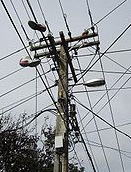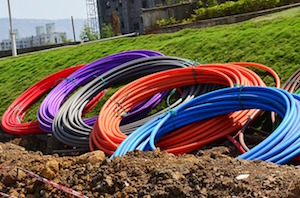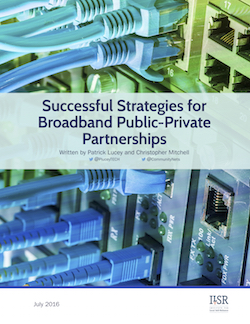
Google Fiber has finally announced its plans for the future after weeks of dramatic speculation that it will lay off half its workforce and give up on fiber-optics entirely. Google has now confirmed our expectations: they are pausing new Google Fiber cities, continuing to expand within those where they have a presence, and focusing on approaches that will offer a better return on investment in the short term.
Nothing Worth Doing Is Easy
In short, Google has found it more difficult than they anticipated to deploy rapidly and at low cost. And in discussions with various people, we think it can be summed up in this way: building fiber-optic networks is challenging and incumbents have an arsenal of dirty tricks to make it even more so, especially by slowing down access to poles.
That said, Google is not abandoning its efforts to drive better Internet access across the country. In the short term, people living in modern apartment buildings and condos will be the greatest beneficiary as Google takes the Webpass model and expands it to more cities. But those that hoped (or feared) Google would rapidly build Fiber-to-the-Home (FTTH) across the country are likely disappointed (or slightly relieved, if they happen to be big incumbent providers).
This is a good moment to talk about the lessons learned from Google Fiber and what we think communities should be thinking about.
Let's start by noting something we have often said: Google Fiber and its larger "access" approach have been incredibly beneficial for everyone except the big monopolists. Its investments led to far more media coverage of Internet access issues and made local leaders better understand what would be possible after we dismantle the cable broadband monopoly.
Benoit Felton, a sharp international telecommunications analyst wrote a very good summary of Google Fiber titled Salvaging Google Fiber's Achievements. Some of my thoughts below overlap his - but his piece touches on matters I won’t address, so please check out his analysis.
I want to focus on a few key points.
This is Not a Surprise

Google is a private firm that has a fiduciary responsibility to maximize returns for its shareholders. More to the point, so is Alphabet, which houses Google Fiber. Google's interest in fiber was not solely pulling revenue out of the network in the same way that Comcast, AT&T, and others do. They wanted to maximize good Internet access to get more people to use the Internet more and thereby increase the value of their ad business. That is why they have been more consumer-friendly in many ways than the big cable and telephone companies. Google believes it wins even when it simply forces other providers to upgrade their networks.
The fact that they are now focused on doing that in a different way or changing the way they are driving network upgrades should not be surprising. Fiber-optic investments in single-family home neighborhoods can take many years to break even whereas using a hybrid fixed wireless and fiber strategy to target the tens of millions of people living in apartments and condos is likely to break even much quicker.
That said, if One Touch Make-Ready policies succeed in Louisville and Nashville, I think we will see more Google Fiber investment in FTTH.
But Google is fundamentally a private firm focused on its shareholder value. And as such, it does not have the right incentives to deploy what has become essential infrastructure. Many of us have objected to the market-driven approach that tends to leave low-income areas behind. Nevertheless, Verizon and AT&T have left far more neighborhoods behind than Google. We believe universal access will be more difficult after market-driven approaches skim the cream out of our cities, leaving public funds to ensure everyone has access.
Fiber Remains A Good Municipal Investment
There is no wireless technology today that will cost-effectively deliver a high capacity connection to single-family homes that gives a deployer a technological advantage over modern cable systems (yes, we need better networks than cable networks offer). Google is not abandoning fiber in favor of wireless. It is changing its focus from near-citywide deployments to buildings with many tenants, where it can use both fiber and fixed wireless approaches to deliver service quickly.
If anything, Google Fiber's change in focus reinforces the importance of smart municipal investments. That can mean a range of things, from Chattanooga or Lafayette approaches to Lincoln's conduit model to Ammon's software-defined network open access approach.
This is especially true in light of 5G wireless, which is still far on the horizon and will require fiber deep into neighborhoods - more fiber than the wireless carriers can easily deploy. Cities that make it easy for the wireless carriers to deploy small cells and connect it with affordable fiber will get these technologies faster and better than those that just wait for the private sector to do everything. Stay tuned to Broadband Bits for an upcoming podcast on how Lincoln has a brilliant model for that.

Waiting Can Only Hurt You
Whether a community intends to offer services directly or simply to encourage more independent service providers, it is now clear that they need to take action. The "Google Lottery" is temporarily suspended. Get busy finding an approach that fits your needs and challenges.
This is especially true for cities that have real potential to meet their needs with smart local investments but have been waiting and waiting at the altar for Google - ahem, Palo Alto, Portland, and others. Stop dawdling and get serious. You have the capacity to do something. Get started.
Google may resume new FTTH build outs, and when it does - it will undoubtedly look more favorably on communities that have dark fiber, conduit, and other assets ready for them. And if Google remains paused much longer, then you will have created assets to use for your own deployment or for attracting a different partner.
Speaking of a different partner, Elliot Noss of Ting reminded me that Google can play around with autonomous cars and artificial intelligence in a big way today. Since they launched fiber, the opportunity cost of using their capital has changed significantly. Compared to the potential returns for deploying fiber to single family homes, A.I., and the potential to control all future vehicular movement seems more lucrative.
Once again paraphrasing Elliot, one of the core talents of an ISP should be dealing with people - from installers to customer service. This is not a core area for Google. Google's engineers have done a stunning job creating their technologies - especially the DVR system. But being a competitive ISP is not just technology - it is interacting with your subscribers.
While Google may be in a pause, Ting is excited to keep moving on. Travis Carter of US Internet in Minneapolis can't wait to lay more fiber next year (winter is about to slow his deployment up here); they see nothing but potential in coming years.
Wireless Is Not Killing Fiber
I want to be especially clear. Companies like AT&T and Verizon love stories about how fiber is too expensive or uneconomic. They have a customer base to protect from competition. They are thrilled when they can scare potential investors in fiber networks.
5G is not magic and won't meet all of our needs. When I started working in this industry 10 years ago, I was told that Wi-Fi obviated the need for fiber. WRONG. But then, I was told that fiber wasn't necessary because WiMax would meet all our needs. WRONG. And then it didn't take long before fiber was supposedly unnecessary because 4G LTE was going to do everything except solve world hunger. WRONG. 4G remains a complement to fiber, not a substitute.
When I talk to people that have only 4G and not a wired service in their homes, they usually complain - whether it is the cost, reliability, or some other factor. And when you look closer at 5G, it is clear that FTTH continues to be a smart investment. And when building a FTTH network, you have an opportunity to lease fiber to those deploying 5G, another revenue source.

Google is not scared of the possibility of 5G making fiber uneconomic. Google is frustrated at the pace of deployment because both pole owners and the networks already attached to utility poles can dramatically slow critical access to those poles by using every day of their allotted time to make a pole ready for a new attacher.
This is not about city permitting - we have once again seen that even when cities bend over backwards to ease deployment access, it is the incumbent providers that continue to be the biggest barriers to new investment (this reinforces a CTC report that communities could reduce outside plant costs by 8 percent at most). There is just no way getting around the mismatch between private sector business models and the need for critical infrastructure. It is capital-intensive and offers a slow return, especially when done correctly.
The Private Sector Needs You
The private sector, Google included, simply cannot solve this problem alone but cities can change the calculus. Phil Dampier agrees. Blair Levin has been making this case for years - see the Next Generation Network Connectivity Handbook [pdf], for instance. But take care with those that are too focused on private investment. Cities need to be very careful in partnerships and should not rely too much on the private sector - our report offers suggestions for how to get the right balance.
Google is taking a pause, but it should be a kick in the pants for the rest of us. Time to get busy building the infrastructure of tomorrow - because some cities already have it today and we don't want to let them have all the fun.







